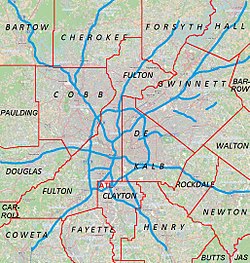|
Conyers Residential Historic District
The Conyers Residential Historic District is an irregularly-shaped historic district in Conyers, Georgia, the only city in Rockdale County, Georgia, located 24 miles east of Atlanta. The district's development dates from the 1840s.[2] It has examples of high style architecture, including the Pierce Home Place (c. 1840s) Greek Revival style, at 988 Milstead Avenue.[2] Atlanta architect Neel Reid designed the Langford House (1913, see photo 1), at 900 Main Street, which has a mix of Classical Revival and Italian Renaissance styles. It has identical side porches and a front porch with a columned portico.[2] Atlanta architect Willis Denny designed the Methodist church (1902, see photo 35), Late Gothic Revival, in red brick.[2] The district has three other churches:
It was listed on the National Register of Historic Places in 1990.[1] It was deemed significant for its architecture and in the area of community planning and development, the latter "because it reflects how a small railroad town grew to accommodate not only the railroad but also the major roads leading to other nearby towns. It was this irregular growth, rather than a planned grid pattern, which became the core of this district. The district developed in a radiating pattern from the wedge-shaped central business district. Railroad, Main, and Milstead are the three main arteries where development occurred."[2]: 10 In 1990, the district included 120 contributing buildings, one other contributing structure, and 16 non-contributing buildings.[2]: 2 References
|
||||||||||||||||||||||||||






